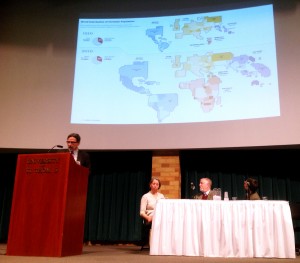A panel discussing papal elections and the future of the Catholic church brought conversation and controversy to the O’Shaughnessy Educational Center Auditorium Wednesday night.
The panel titled “Habemus Papum” or “We Have a Pope,” made up of professors Michael Hollerich, Massimo Faggioli and Gerald Schlabach, covered the history of past papal elections, the upcoming papal conclave and the chance that the next pope might not be European.

Hollerich started by speaking about past elections, calling them “the last relic of an electoral principle that was once far more common in the church,” referring to the fact that cardinals are no longer elected but appointed.
He outlined the changes in the election process since the Byzantine Empire, when a pope could not be elected without the approval of the emperor and could also be dismissed by him. This continued until the 8th century.
Faggioli followed Hollerich, speaking about the history of papal conclaves and the importance of the upcoming conclave.
“The conclave as an institution has changed constantly since the 20th century,” Faggioli said. “Every pope except Benedict XV has changed slightly the rules of the conclave.”
Among the changes made in the 20th century were the publishing of the Code of Canon Law, establishing that papal elections were the business of the college of cardinals and not the ecumenical council, as well as the rule that cardinals more than 80 years old could not vote.
Faggioli said the upcoming conclave will be different in many ways, especially because the church is now global.
Though Benedict XVI has re-Italianized the college of cardinals, with 52 percent of voting cardinals being European, Europe is home to only 24 percent of the world’s Catholics. Latin America, which has 42 percent of Catholics, has only 16 percent of the vote.
“Pope John Paul II tried to re-balance this by appointing more Asians or Africans or Latin Americans,” Faggioli said. “Pope Benedict has re-Europeanized the college of cardinals.”
Despite the Europeanization of the college of cardinals, Faggioli said he thinks this conclave will be unique.
“I think that this conclave is extraordinary, and not just once in a lifetime, but once in one millenium,” Faggioli said. “It will be open to new solutions and possible changes because pope Benedict resigned.”
Schlabach followed Faggioli’s remarks, emphasizing the possibility that a pope will be appointed from the “global south,” meaning Africa or Latin America. Though there has been talk of an American pope, Schlabach said it is unlikely.
“The best thing for the Catholic church in America would be to not have an American pope, but a pope from the global south” Schlabach said. “There are twice as many Catholics today in Africa as in North America.”
Some students who attended the panel were struck by the idea of a pope from the southern hemisphere.
Freshman Teresa Guerin said she was surprised by what Schlabach thought would be best for the church.
“Schlabach’s information that it wouldn’t be good for an American to be pope, I didn’t really think about it but with the statistics it kind of makes sense,” Guerin said. “He’s probably right, it would be better to have someone from the global south since I think America is getting more secular.”
Freshman Adam Maher was interested in the idea of having a younger pope.
“I’m not really familiar with the politics of the church but I learned a lot, especially about the idea that there could be a younger pope in his 50s,” Maher said.
Despite the deliberation, Schlabach was unwilling to predict an outcome.
“I’ve just tried not to play the game of speculation,” Schlabach said. “I think what’s most likely to happen is that we’ll be surprised.”
Grace Pastoor can be reached at past6138@stthomas.edu.

